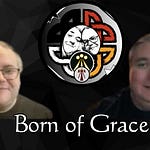Join Charlie, a non-binary sci-fi fantasy writer, and their husband Brian as they delve into the importance of celebrating our works in life. Misconceptions about humility and the significance of commemorating achievements are discussed, alongside insights on spirituality, interconnectedness, and resisting negative forces. This thoughtful discussion revolves around themes of co-creation, gratitude, and finding joy in small victories, ultimately advocating for a balanced approach to life's endeavors.
Support us on: https://ko-fi.com/cedorsett
Become a patron of the arts patreon.com/cedorsett
For Educational Resource: Wisdoms Cry https://wisdomscry.com
For all of the things we are doing at The Seraphic Grove go to Creation's Paths https://www.creationspaths.com/
BlueSky https://bsky.app/profile/creationspaths.com
Threads https://www.threads.net/@creationspaths
Instagram https://www.instagram.com/creationspaths/
Transcript:
Charlie: [00:00:00] The apostle James reminds us that faith without works is dead. But works without celebration are a dull monotony that will bring us to our knees and cause us to stop doing whatever it is we were doing. So let's have a little chat about celebrating our works and what that actually means.
Charlie: Hello everyone. My name is Charlie. I am a non-binary scifi fantasy writer, and I am joined by my wonderful husband Brian.
And today we're going to be talking about celebrating our works. Because this is something we do not do. And it's I think rooted in a very understandable and common [00:01:00] misunderstanding of humility. Where we think humility is not talking, it's keeping your head down. We have confused the concept of humility. We have confused the concept of humility with obedience or subservience. That is not what this word means. That is something that the Imperial church and the patriarchal powers that be want humility to mean. That's not what it means. Humility means everything in its proper place. So something doesn't take up more space than it ought. Now that is also a fraught definition because we can add onto that all kinds of misogynistic homophobic and racist terms about how much space something ought to take up. What that really comes down to is not centering ourselves anywhere really, because we are not the main character of the [00:02:00] story.
It's about taking up the space, deserved the space that is required for the thing to have. If you've done something and you want to celebrate it, celebrate. That is not an in humble act. If every time you have a conversation with somebody you were bragging about a thing. Then it is taking up an excess space.
Brian: An easy exercise. Entertaining exercise to do. And everybody's daily life. Is when you're in a conversation with somebody or actually when there's a group of people. Having a conversation. And it's your time to. Not be involved with the conversation, just observe and watch.
You will see. Someone inevitably. Start stepping over other people's moments to speak. Because humility is knowing, this is the moment where I'm supposed to occupy this space of the conversation. [00:03:00] And then knowing in other moments, I'm not supposed to occupy the conversation. And inevitably you'll have a conversation where say somebody is talking about something in their personal life. And it is on the focuses on them or on the subject of their conversation.
And another person will step in and be like, and it's all about me. And me. And be, and completely forget. Like. That was not the topic at that point. It's very interesting. Way to see, oh, this is what is humble. And this is what is not humble. You know, How to occupy those spaces because it always fluctuates. It changes.
Charlie: This is where I like to apply what I, in my own brain called the Muppets rule. Miss piggy is too boastful. And Kermit is too quiet.
Brian: They're both not humble. Because Kermit at times needs to be more assertive [00:04:00] needs to fill the leadership role. That Kermit. Is cast in and at times, miss piggy. Needs to step back. And not be in the leadership role when she is not supposed to be in the leadership role. There are times when she is supposed to be . A facilitator or a leader. And. Times when she is supposed to be outspoken.
Charlie: So learning to have this. Much more proper view. And embodiment of humility really is the heart of everything that we're talking about in all of our spiritual work. I was talking about this with a friend the other day who is just learning. Magic and just learning to walk the path. One of the things that I brought up is how people very often get up in their head and are like, oh, I am so special because I am interacting with the grand energies of the cosmos. I am interacting with the grand spirits of the cosmos that yeah, everyone does on a daily [00:05:00] basis. You're just more conscious of it and not special. That's called being a live. I think that's where. We get really lost and confused in a lot of this. The Imperial church especially has wanted to relegate mystical activity and any true connection with spirit. To something that only a chosen few have access to. That when we start having those experiences. We tend to puff ourselves up and go, I am one of the chosen, I am one of the blessing ones and that's no, you're like the rest of us. You're just allowing yourself to be conscious of the experience that most people ignore or allow to go unremarked upon.
It's rabbi David Cooper points out in his wonderful book. God is a Verb. The point of all of this is to learn to be Goding. G O D I N G. Goding, [00:06:00] we are living God in every moment and in everything that we do and in so doing, we are interacting with angelic and demonic forces, angelic forces, being those that are bringing benefit and blessing and good into our lives. And demonic forces bringing in misfortune and illness and back bad things into our lives.
Everyone is experiencing those every day. They may not be labeling them angelic and demonic but to many people when they start using those labels are suddenly like all I have the center of the great cosmic war for the universe. Because angels and demons are warring over me. And that is not the case. I think that when we start talking about inspiration, which is a big part of the work is learning to access that Imbas to access that Awen.
Again, people feel special. Ah, the inspiration is upon me. Because again, the Imperial [00:07:00] church has locked this idea of the great men who wrote the Bible. Did so under the inspiration of God. The awen of God. The Shifa of God, the influx of power. Can you came upon them. And so again, only special people. No, no, it's not only special people. These are the people that have been remembered. Not everyone will be remembered but everyone has access to those energies to that inspiration to that influx of divine. Power that can come in and give us the strength that we need to accomplish great and amazing things. That is really what needs to be celebrated here. Look, I grew up in a Baptist church. I grew up in non-denominational churches and evangelical churches. And it's not uncommon. To hear people say, That you should just give God the glory for all the things that happened in your life. I'm not opposed to [00:08:00] that. But if you are doing that in such a way that you are. Not allowing yourself to have any apparent agency. This is a word we've used a lot here. This freewill, this agency. That as we're reminded by the apostles, the spirit of the prophet is subject to the will of the prophet. We are not blind puppets in any of this. So when we allow ourselves to remember that, And act from that place. We are participating. As Matthew Fox. And his book, original blessing reminds us.
We are co-creators with God. We are cooperating with the divine to make this world what it is. That cooperation deserves celebration. Bye the way most people give glory to God. It is in a way that deprecates. Their own contribution.
Brian: Once again, God wants your love. Not your sacrifice. Even if it's [00:09:00] sacrifice of your own. We'll or a sacrifice of your own. personhood, that's not humility. God wants you to occupy that space that they have given you. That they have put you here to occupy. And doing anything less than that is actually in a way sacrilegious. Yes. You're supposed to. That's your space. I enjoy it. and celebrate it.
Charlie: And you need to take it as your own. We talk about Elijah in a lot of ways, I've often marveled at how he had a problem with this, right? He can stay in there on the mountain and called down the fire of God onto the literally has water poured upon it. Sacrifice on the hill, right? Demonstrating all this divine power and then slaughter. 500 people in the riot that ensues afterwards. Right? But. He then flees into the mountains and hides because he's unworthy. I think this shows the imposter syndrome that we get ourselves into and why [00:10:00] it is important to. Learn how to celebrate our works. We're in this season of Lunasa. So we're in the season of harvest the first fruits and we're taking time to. Either collect or recognize the labors that we have done so far this year and celebrating. Those harvests.
Brian: It is also so important to celebrate one's works because, To get into the forces of evil or darkness or energies that work against us. Through bringing us down. There are the direct optimizational ones, the ones that use violence that try to take. Ours are piece from us. But there is also the more insidious where it tricks us. It works within our free will, but it tricks us to give it up. In understanding humility in particular as moments to celebrate our words. It makes it much harder to get tricked into giving up our own peace. If you're giving up [00:11:00] our personhood. In giving up that space. That we are supposed to occupy. It helps to protect us from giving ground. To evil, I guess you could say to be very old-school biblical about it.
Charlie: Also many of the works that we are called to. Are very long-term projects that may never be finished in our lifetime. When we're talking about Tikkun Olam the restoration of the world, right? The. Mystical work that we're doing. The. Just building a good family . For those who have children, you may not know. The end result of what, of, what you've done with your children. Because their lives will. God willing. Extend beyond yours, right? So many of the works that we do have such a long-term. outcome, right?
Brian: This is where I like to remember. The phrase that you taught me. I strive daily to make perfect to that, which God has already made. Perfect. [00:12:00] That's Paul Paul. Strive daily. Every day, it's a struggle. Every day. It's not done. It's never done. It's never completed. Every day, I work with humility. For sure. These I don't pay. Backslide every day I should be celebrating creep, you know? The worms and celebrating. And recognizing them.
Charlie: And when we don't take time for those little celebrations. Because the great work we'll not be finished in our lifetime. the grand vision of a utopian world where all perfection rains, and there is no sorrow or grief, and we have cured all disease.
Whether or not, you think we will ever get there or not. It is a worthy goal to strive for. Right. We want the world to be a better place and succeeding only better in every generation.
We won't get there. It's not, there's not going to be. It's so far off in the future. The idea that we will [00:13:00] have anything remotely like a panacea and we probably won't have a actual panacea. We will have a whole bunch of medicines. That help cure and treat various ailments. But we need to celebrate every little thing. You get a little sketch done celebrate it. You get a little story done, a little poem done. Celebrate it. You finished cooking dinner, celebrate it. In celebrating those little victories. We are reminded that good things are happening. This is the greatest tool of the enemy. When Paul says we wrestle not against flesh and blood. But against powers and principalities in high places. This is one of the things that he's talking about. That. It's not talking about just, oh, there are demons. It's these pervasive attitudes of, oh, it's not, you're not really doing enough.
You will never be able to do enough. This [00:14:00] is an incremental change. It's not going to actually amount to anything. There's so much negativity and cynicism. That is perpetrated in the world because it empowers those who are already entrenched in power to get us to believe that what little we can do. Isn't actually worth doing, because it isn't achieving the grand sweeping goals that we want to achieve. Look, I am very open about my opinions, about a lot of things that we should have as far as healthcare and various political. Stances right. But I am opposed to the revolution. The reason for that is not because I don't think that it would be glorious if we could snap our fingers and suddenly make everything right with the world. I know history. History teaches us that. Revolutions tend to fail. Revolutions. I become solipsistic. They turn into themselves. They start seeking [00:15:00] the enemies of the revolution. And become their own downfall. They sowed the seeds of their own downfall. I think this is very well typified by the French revolution. The French revolution had lofty and beautiful plans. Beautiful goals. Beautiful aspirations. That led to the terror and led to a whole bunch of people having their heads chopped off, which led to a revolution that led to another revolution that led to Napoleon. So all of this democratic fervor gave us the first emperor of France.
Oh, that backfired. And we can see this also in the American revolution. The American revolution led to the civil war. All of the compromises, all of the grand statements, all of the very abrupt change that was tried to have in the creation of the United States. It makes a direct line. to. The civil war, the civil war was inevitable. Through the three-fifths compromise [00:16:00] through. Just, we can go through the whole list. Abrupt revolution, sows, the seeds of its own destruction. Because if people aren't ready for the revolution, this is the problem that Christianity had in the first three centuries. Here comes Jesus. Broke into history. With this radical idea. And it really shouldn't be a radical idea, but it is. Said in Hitchhiker's guide to the galaxy 2000 years after somebody was nailed to a tree for saying, wouldn't it be awfully nice. If we were kind to each other. Which is, Hey. Great summation. Of what happened, love God with all your heart, mind, and spirit and love your neighbor as yourself. Ooh, crucify him. But that radical idea. And it is a radical idea. Because he. Talked about being nice to people outside your tribe. Outside your kin group, outside your language group. , he very much just talking about taking care of people outside your social economic class. . You should treat the [00:17:00] poor, well, the people that who are in prison. The people who are hungry, who are thirsty. He tells the story about the good Samaritan.
He's this, these are radical thoughts. And radical ideas. That. I don't think strike us as radical as they were at the time. And this is why they had to be co-opted by empire.
They had to be co-opted by empire. They're too radical to survive.
What we see throughout history. How did this movement then continue. The Roman empire was great at crushing things that didn't like. We don't talk about Apollonius or Mithraism. Or, or, or, or right.
But Christianity survived. Partially because it was successfully co-opted. But also because there were too many people. Who felt this change who felt this kinship? Who felt this connection? We're celebrating it even in quiet. In the secret places in [00:18:00] overt places.
They celebrated the work.
And it was able to survive. Down to us today.
That even with all of the problems caused by the very overtly Imperial church that we see in Rome. To the evangelical. Christian nationalism that is threatening to take over the country. There are still those who hear the still small voice. The simple message. Love one another. This is how they will know you, that you love one another.
As I have loved you. This is the message we get from Christ. And it is so simple that it sounds trite.
But it is the hardest. Thing. To do.
And if we're not celebrating all of the little victories. Yes, we want peace on earth. But ending squabble in your family is part of bringing peace on earth. Yes, we want to make sure everyone is fed. But, you know what? Sometimes finding enough money to make sure that your kids have lunches. These little moments [00:19:00] of celebration.
And they could be tiny.
when I was a kid. I didn't understand why we said grace before meals.
it's a weird thing to do. I'm hungry. I've had to smell this food being prepared all this time. And now we're going to stop. Most of the time in our family, we said silent grace. We'd no one actually prayed over the food. We all just stopped. About our heads for a minute. And then someone would say, amen.
And that's when we knew we could eat
it wasn't something that we actively. Took part in, right. You know what I'm saying? It wasn't a group effort. For the most part, it was only on holidays and special occasions that somebody would say grace for everyone.
And it's weird. Why are we doing this? I've smelled this food being prepared. I'm hungry. It's right here. Why can't I eat?
And it's because taking that little moment of celebration. Either to say, thank you for the person who cooked the meal, which is. Frighteningly lacking in most people saying grace.
Somebody made that food [00:20:00] for you. Your mom, your dad. Your spouse, somebody made it. A friend of yours, whose house here at a chef at a restaurant that you're sitting there, somebody made that food. You may have made that food. But somebody made that food and you should be. Thankful and grateful and celebrate. That process and of itself, but also taking that moment. Because I grew up. I'm in a family of farmers with. A lot of farmers around us. To be thankful to the people who grew the food. To the animals. They gave their lives for that food. To the plants.
They grew those vegetables in that those fruits. Taking that time to be grateful. To be thankful to celebrate. All of the work, all of the work that you didn't see, you weren't there when that seed was planted and that. Plant was tended in heart and harvested. All the people that it took to get it from that farm. To the store, to the table.
To celebrate that. Gives meaning to [00:21:00] what you're having. And you realize that you are part of a community. Every time you sit down and have a meal. You were part of a community, even if you. And this is what drives me. Wild about people who are like, oh, I did this all myself. No you didn't. If you grew that carrot.
Planted the seed. From a seed that you had harvested before. With season before. I grew that carrot. Harvested that carrot. Cooked that carrot. You still didn't do it alone. Rain. All of the soil, bacteria, all of the worms, all of the insects that help to fertilize and make things possible. There's a whole myriad. Of creatures that were responsible for bringing that carrot onto your plate. Beyond you, we never do anything. You can't even digest your food alone. The gut bacteria that live within you, the flora and fauna inside of you. Make available to you, the [00:22:00] nutrients in there, you can't even digest your food alone.
Taking that moment of celebration. For all of that work. That you don't see, you don't see all of the little bugs that are helping you to get the most out of that food inside you, that we're working in the soil. to make sure that plant had the nutrients that it needed. You weren't seeing any of that. Taking that moment. Reminds you that even if you are alone, Even if you're as isolated as you could possibly be. And you grew that plant from seed and harvested and did all that work. You didn't do it alone.
We are never alone.
That's what celebration. Can bring us. It's not just this gratitude or this moment of peace on, in the great work where we realized. I accomplished something. It's infant testimony, small little piece. Which is great and wonderful, and we need to be celebrating this thing. But also reminding ourselves. The vast hoard of [00:23:00] creatures. Big and small. Necessary. For even the smallest thing. To get on your table.
We're not alone. We are never alone. And those are the lessons we've learned from celebration.
That's what we get. From taking those times that time. And those moments to celebrate. And that's true for everything. You didn't make that painting by yourself. Somebody probably made those paints. And if you made your own paints, somebody probably harvested the materials that were made for those paints.
And even if you harvested those materials for yourself, they came from plants and minerals and stuff that had an entire cosmos. Conspiring for those pigments to come into being.
That's what it means to give God the glory.
When you give God the glory for what happens. God is living in all things. God is the one in whom we live moving. RB and not just us, everything, the cats, the dogs. The ants, the butterflies. The little bacteria. And [00:24:00] the great storms. They all have their being in the OneLife.
That interconnectedness, that. Profoundly. Deep interconnectedness.
Needs celebration. Because as I've said, It's way too many times people are probably tired of hearing me say it. We are forgetful. We are easily distracted. The little pains that we have in our lives. Can I quickly make us forget of all the friends that we've ever had. All of the good things that have ever happened to us.
That's where gratitude and celebration come in. They're taking those moments to remember. To celebrate and to be glad in it.
I think that's a pretty good thing.
I think that's something we should be doing more of. In every aspect of our lives. Every time we finish an episode of the show. We have a little bit of celebration. Y cause we got another one recorded.
Every time. Every step along the way from doing the thumbnails, that show up. To getting it [00:25:00] posted a little bit of celebration.
' cause it's work. It's labor. And it can become monotony. It can become drudgery. Every time I write a word, a sentence. A story. A little bit of celebration. In fact, this is one of the reasons why in my own personal life, I've started writing short stories again. Because every idea I've been working on are these grand epic tomes that take forever to do.
Charlie: And I know I need these moments of celebration where I can celebrate the work. So I'm going to write some short stories. Harvest a little bit of that joy. That little bit of those little moments of, I finished a story. Yay.
And really have that joy in my life.
Because while I agree with tick, not Han. That basic joy is there.
Because no matter how depressed I've been in my life and I have. Suffered from depression off and on my entire life. You breathe. You enter that mindful state, basic joy is sitting there waiting. It [00:26:00] is.
We're easily distracted from it.
And so celebrating is how to remind ourselves. Hey. Pay attention. There are good things. Don't ignore the good things.
I hope this has meant something for you.
I hope that this has helped you out. Celebrate something. In fact, if you go to https://www.creationspaths.com/. Find this episode. And in the comments there. Let us know. What are you celebrate? If you're listening to us on Spotify right there. Right. Where you're listening to us, you can comment right there. let us know. what are you celebrating? If you're watching us on YouTube or YouTube.
Just under the dupli. Do.
You can leave a comment, let us know what you're celebrating. Celebrate. Just take a moment and say, I am happy take a moment to celebrate. And while you're there, if you haven't liked subscribed or any of the things that you can do on all of the platforms that this podcast is out on, that really helps us out a lot. Also remember sharing what we're doing really helps us out a lot. If you're subscribed to our email list for [00:27:00] the email to somebody you think would really like this episode. share us on your social media, that helps out a lot.
And of course, if you have a few pennies that you can throw our way, if you head over to https://www.creationspaths.com/, you can join the sub stack over there, which helps us out a lot. Also, we're going to be putting out some classes over there that you will get first access to. If you're supporting us over there. You want us to support us on https://ko-fi.com/cedorsett and patreon.com/cedorsett on both. And. That goes to support everything that I'm doing, the art, the music, the stories. And this. thank you so very, very much for listening.
Blessing and light be upon you in all of your endeavors. Amen.
Brian: Amen.
[00:28:00]












